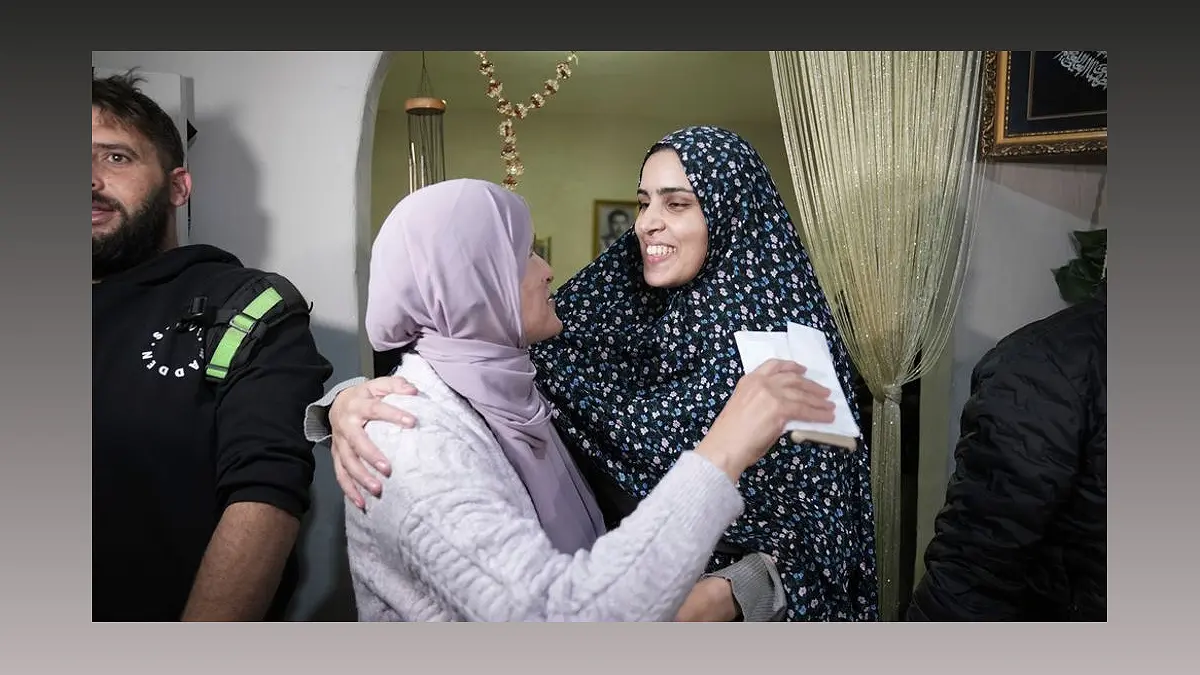In a heartwarming turn of events, over three dozen Palestinian prisoners have been released from Israeli prisons as part of a cease-fire agreement between Israel and Hamas. The hero's welcome they received upon their return to the occupied West Bank stirred massive crowds into a frenzy of celebration and emotion. Join us as we delve into the bittersweet journey of these prisoners and the impact of their release on both Palestinian and Israeli societies.
A Hero's Welcome: The Joyful Return of Palestinian Prisoners
Experience the emotional scenes as Palestinian prisoners are welcomed back home in the occupied West Bank.
As the Palestinian prisoners were released from Israeli prisons, they were greeted with a hero's welcome in the occupied West Bank. The scenes were filled with overwhelming joy, as families and supporters gathered to celebrate their return.
Flags were waved, victory signs were flashed, and chants filled the air as the prisoners made their way through the crowds. It was a moment of triumph and relief for both the prisoners and their loved ones, who had eagerly awaited this day.
Witnessing this heartwarming homecoming, one cannot help but be moved by the resilience and determination of the Palestinian people. Their unity and unwavering support for those who have endured captivity is truly inspiring.
The Impact of the Cease-Fire Deal: A Step Towards Peace?
Explore the implications of the cease-fire deal between Israel and Hamas and its potential impact on the ongoing conflict.
The release of Palestinian prisoners is part of a larger cease-fire deal between Israel and Hamas. This agreement aims to bring a temporary halt to the hostilities and create an opportunity for dialogue and negotiation.
While the release of prisoners is a positive step towards peace, it is important to recognize that the underlying issues and grievances that fuel the conflict remain unresolved. The true impact of this cease-fire deal will depend on the commitment of both parties to engage in meaningful dialogue and work towards a lasting resolution.
Can this cease-fire pave the way for a more peaceful future? Only time will tell, but it is undoubtedly a glimmer of hope in a region plagued by violence and division.
The Emotional Toll: Joy and Anguish for Families
Delve into the mixed emotions experienced by families on both sides of the conflict as their loved ones are released or held captive.
For families on both sides of the conflict, the release of prisoners evokes a whirlwind of emotions. The joy of reunion is tempered by the anguish of those still awaiting the return of their loved ones.
Each release brings a mix of relief and grief, as families celebrate the freedom of some while grappling with the continued captivity of others. It is a reminder of the deep divisions and pain that persist in this long-standing conflict.
How do families cope with this emotional rollercoaster? The resilience and strength they display in the face of adversity is truly remarkable, serving as a testament to the power of love and hope even in the most challenging circumstances.
The Complexities of Prisoner Exchanges: A Controversial Policy
Examine the controversial practice of prisoner exchanges and its implications for both Israeli and Palestinian societies.
Prisoner exchanges have long been a contentious issue in the Israeli-Palestinian conflict. While they can be seen as a humanitarian gesture aimed at securing the release of captives, they also raise ethical and security concerns.
Israel's policy of administrative detention, which allows for the imprisonment of individuals without charge or trial, has drawn criticism from human rights groups. The release of prisoners is often met with mixed reactions, with some viewing it as a necessary step towards peace, while others argue that it incentivizes further violence.
What are the implications of these prisoner exchanges for the larger conflict? The debate surrounding this issue highlights the complexities and challenges of seeking a resolution in this deeply entrenched and multifaceted conflict.

